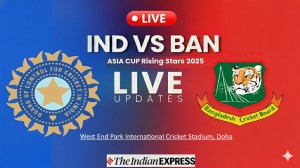EXPRESS EXCLUSIVE — US has accepted India’s minimum deterrent, asserts Jaswant
NEW DELHI, MARCH 16: The bitterness and anger of the Pokharan tests between India and the US have been greatly reduced, resulting in Washi...

NEW DELHI, MARCH 16: The bitterness and anger of the Pokharan tests between India and the US have been greatly reduced, resulting in Washington’s acceptance of India’s nuclear deterrent as well as a recognition of the fact that “map-making in the sub-continent” must come to an end.
In an exclusive interview with The Indian Express on the eve of the visit of US President Bill Clinton to India, External Affairs Minister Jaswant Singh today said the US acceptance of the sanctity of the Line of Control was “both a reaffirmation of India’s position and a reiteration of what President Clinton and former Pakistani prime minister agreed upon on July 4 last year…that territory must not be violated.”
Singh added, “What I had said many months ago, that map-making in the sub-continent must cease, is now being said by a number of people in a number of ways.”
The foreign minister stressed that New Delhi continued to be “profoundly disturbed” by Pakistan’s stated intention to continue a jehad’ against India, adding that “one can scarcely expect jehad as an instrument of foreign policy or as acceptable behaviour between nations.”
Singh was, however, not willing to say whether the recent comments made by US Secretary of State Madeleine Albright on freezing the borders between India and Pakistan along the LoC implied, finally, the US acceptance of Kashmir as a part of India.
But highly placed sources in the Ministry of External Affairs pointed out that Albright’s statement at the Asia Society in Washington two days ago was a far cry from May 1988, when she had taunted India with the following words: “India has dug itself into a hole.”
The ministry sources said the relationship with the US “had come a long way since then”, indicated not only by Albright’s remarks about a strategic partnership between the two countries, but also the fact that China had become “increasingly perturbed” about Washington’s acceptance of India’s minimum nuclear deterrent.
Singh confirmed that the US, indeed, had accepted that India “would keep” a minimum nuclear deterrent, despite the fact that this went against a resolution (No. 1172) put together by the permanent members of the Security Council after the Pokharan tests two years ago.
“On account of the statements made by US officials at different times and at different fora, and most lately by US Deputy Secretary of State Strobe Talbott, I do say that Washington has accepted India’s minimum nuclear deterrent.”
The significance of Singh’s statement is that the US, after much prevarication around the truth, has finally accepted that India’s nuclear programme is here to stay. This is the first time since the Indo-US dialogue began nearly two years ago in the aftermath of the bitter criticism of India’s nuclear tests that a senior Indian minister has gone on record about the US view.
The implication of the US recognition is clearly far-reaching in nature. It means that the sanctity and exclusivity of the nuclear club — only five powers who are also the only countries to have permanent membership of the UN Security Council — may be finally over.
“All the consequences of the Pokharan tests as well as the differences in perception between India and the US have been greatly reduced. Certainly, there is much greater understanding of each other’s positions…India’s nuclear weapon status is a fact and facts can neither be undone or done away with,” Singh said.
Asked if the Clinton visit had real meat in it or was merely a grand tamasha, Singh emphasised that the visit must not be seen in terms of a “destination” but rather a “direction” to the future relationship.
Ministry sources, brushing aside criticism that Clinton is already a lame-duck president, have said they hope that the agenda of the visit will carry them through to a better relationship, irrespective of the party that comes to power in the US next year.
Photos



- 01
- 02
- 03
- 04
- 05




























